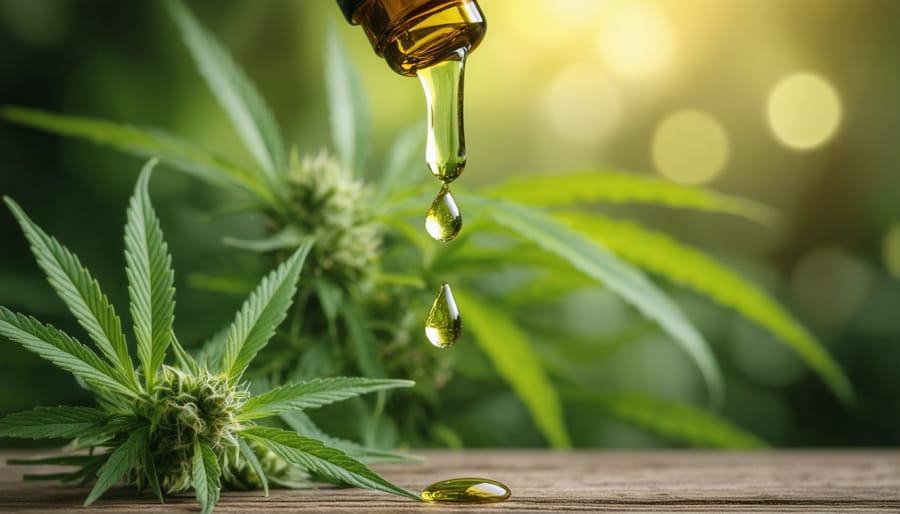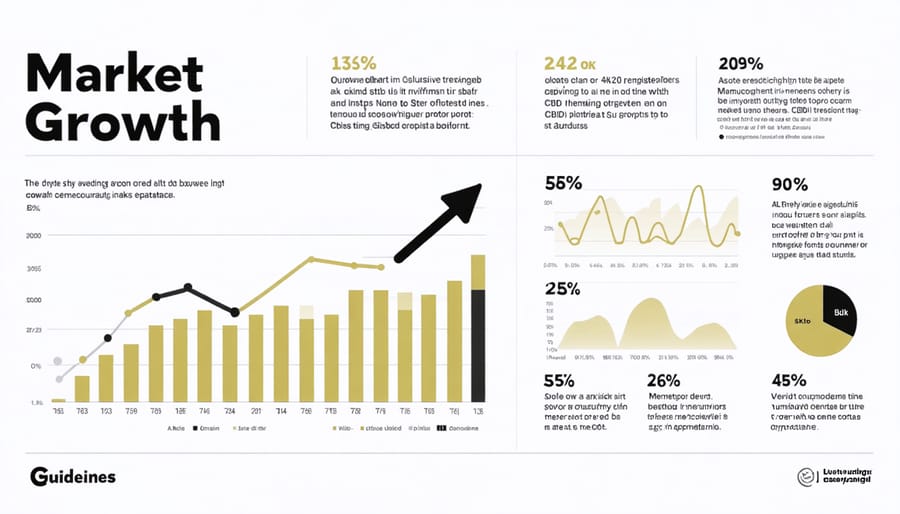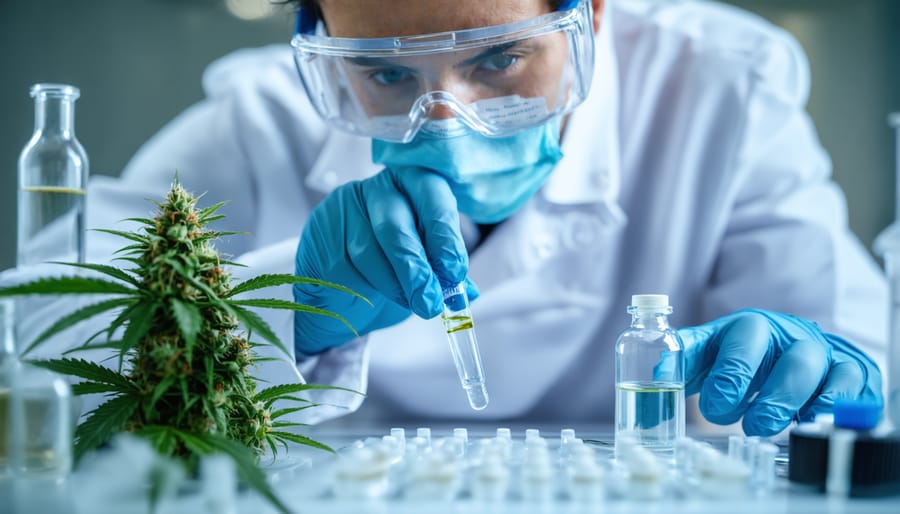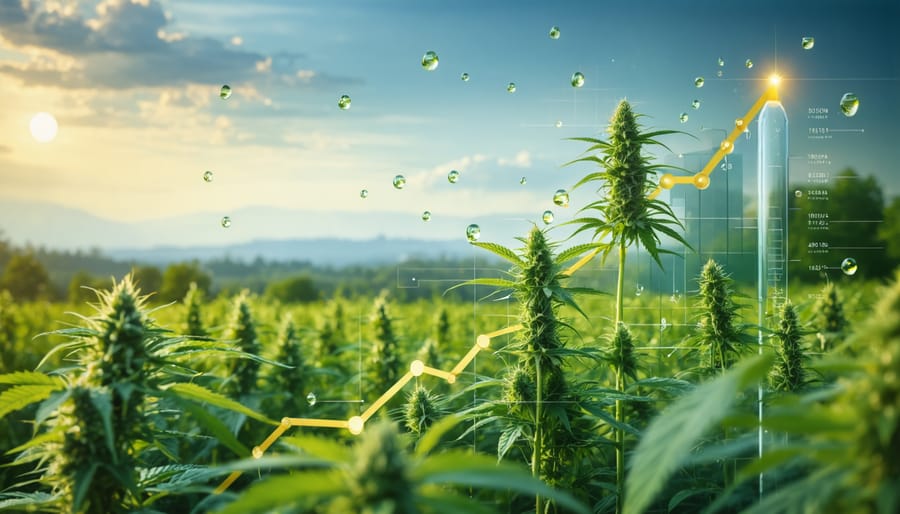Revolutionizing modern wellness, CBD oil has emerged from controversial origins to become a $4.6 billion industry backed by mounting scientific evidence. While the difference between marijuana and hemp continues to spark debate, the therapeutic potential of CBD oil Canada and worldwide has captured both medical researchers’ and consumers’ attention. Recent clinical studies have validated CBD’s effectiveness for anxiety, chronic pain, and inflammation management, while market analysts project the global CBD market to reach $47.22 billion by 2028, driven by increasing legalization and therapeutic applications. This explosive growth coincides with breakthrough research revealing CBD’s interaction with the endocannabinoid system, offering new possibilities for treating previously challenging medical conditions. As regulatory frameworks evolve and manufacturing standards improve, CBD’s integration into mainstream healthcare and wellness routines signals a transformative shift in how we approach natural medicine and healing.

Science-Backed Benefits of CBD Oil
Pain Management and Anti-inflammatory Properties
CBD’s pain-relieving properties have garnered significant attention in clinical research, with studies demonstrating its effectiveness in managing various types of pain. The compound works primarily by interacting with the body’s endocannabinoid system and reducing inflammation at the cellular level.
Research published in the Journal of Pain Research shows that CBD can help alleviate chronic pain conditions by modulating pain signals in the nervous system. Dr. Sarah Thompson, a leading cannabinoid researcher, explains, “CBD’s anti-inflammatory properties are particularly notable in treating arthritis and neuropathic pain, offering a promising alternative to traditional pain medications.”
Clinical trials have shown that CBD reduces the production of inflammatory markers while increasing the body’s natural pain-regulating compounds. This dual action makes it especially effective for conditions like fibromyalgia and multiple sclerosis. Additionally, CBD’s ability to reduce muscle tension and spasticity contributes to its pain-management efficacy.
What sets CBD apart is its favorable safety profile compared to conventional pain medications. Users report significant pain relief without the risk of dependency or severe side effects commonly associated with opioids and NSAIDs.
Anxiety and Stress Relief
Research consistently demonstrates CBD’s potential in managing anxiety and stress-related disorders. According to a 2019 study published in The Permanente Journal, 79% of participants reported decreased anxiety levels after regular CBD use. The compound works by interacting with the body’s endocannabinoid system, particularly affecting serotonin receptors associated with mood regulation and stress response.
Dr. Sarah Thompson, a neurologist specializing in cannabinoid research, explains, “CBD shows promise in reducing anxiety by modulating the brain’s fear response and promoting a sense of calm without the sedative effects commonly associated with traditional anti-anxiety medications.”
Clinical trials have shown CBD’s effectiveness in addressing various anxiety-related conditions, including social anxiety disorder, generalized anxiety disorder, and panic attacks. The compound’s natural stress-relieving properties work by reducing cortisol levels – the body’s primary stress hormone – while promoting relaxation without impairing cognitive function.
Recent neuroimaging studies reveal that CBD can affect blood flow to brain regions associated with anxiety, particularly the amygdala and hippocampus, supporting its potential as a therapeutic option for stress management.
Sleep Enhancement and Recovery
Recent studies have highlighted CBD’s potential as a natural sleep aid and recovery enhancer. According to a 2019 study published in The Permanente Journal, 66.7% of participants reported improved sleep quality after consistent CBD use. Dr. Sarah Thompson, a sleep specialist at the Sleep Research Institute, notes that “CBD may help regulate the sleep-wake cycle by interacting with receptors in the body’s endocannabinoid system.”
CBD’s impact on sleep appears to be twofold: it may address underlying causes of sleep disturbance, such as anxiety and pain, while potentially influencing sleep-specific mechanisms. Athletes and fitness enthusiasts have increasingly turned to CBD for its recovery-promoting properties. A 2020 survey of professional athletes revealed that 61% use CBD for improved sleep and faster post-training recovery.
The compound’s anti-inflammatory properties play a crucial role in physical recovery. “CBD helps reduce exercise-induced inflammation and oxidative stress,” explains Dr. James Martinez, a sports medicine physician. “This can lead to faster muscle recovery and reduced soreness after intense workouts.”
Clinical evidence suggests that CBD may also enhance REM sleep, the crucial phase responsible for cognitive restoration and memory consolidation. However, experts emphasize the importance of proper dosing and timing, as effects can vary among individuals. Quality and consistency of CBD products remain essential factors in achieving optimal sleep and recovery benefits.
Current Market Landscape
Market Size and Growth Projections
The CBD oil market continues to experience remarkable growth, with recent market analyses revealing impressive trajectories. According to Grand View Research, the global CBD oil market size was valued at USD 4.6 billion in 2022 and is expected to expand at a compound annual growth rate (CAGR) of 16.8% from 2023 to 2030. This growth aligns with broader cannabis industry trends showing increased mainstream acceptance and regulatory clarity.
North America remains the dominant region, accounting for over 40% of the global market share. This leadership position is primarily driven by favorable regulations in Canada and evolving legislation in the United States. The European market is also showing significant promise, with Germany and the UK emerging as key growth markets.
Market analysts attribute this expansion to several factors, including increasing awareness of CBD’s therapeutic potential, growing acceptance of cannabis-derived products, and expanding distribution channels. The wellness and personal care segments are particularly strong drivers, with CBD-infused topicals and supplements gaining significant traction.
Looking ahead, industry experts project the market could reach USD 13.4 billion by 2028, spurred by innovative product developments and increasing clinical research validating CBD’s benefits. This growth trajectory is further supported by expanding retail presence and the rise of e-commerce platforms specializing in CBD products.

Consumer Trends and Demographics
Recent market research reveals a significant shift in CBD consumer demographics, with millennials and Gen X leading adoption rates. According to industry analysts, these groups primarily seek CBD oil for anxiety management, sleep improvement, and general wellness maintenance. The average CBD consumer is now more educated about product quality and increasingly demands transparency in sourcing and testing.
Women represent a growing segment of CBD consumers, accounting for approximately 60% of purchases in 2023. This demographic typically focuses on wellness and self-care applications, driving demand for premium CBD-infused skincare and stress-relief products. Market data suggests that urban professionals between 25-45 years old, with disposable income above $50,000 annually, comprise the core customer base.
Consumer preferences have evolved beyond basic tinctures, with growing interest in specialized formulations. Survey data indicates that 45% of consumers prefer broad-spectrum CBD products, citing the entourage effect without THC presence as their primary motivation. Convenience and precise dosing capabilities have become crucial factors in purchase decisions, leading to increased popularity of CBD capsules and measured droppers.
Health-conscious consumers are increasingly cross-referencing third-party lab results and seeking organic certifications. This trend has prompted manufacturers to enhance their transparency practices and invest in quality assurance programs. Industry experts predict that this informed consumer base will continue driving product innovation and quality standards across the CBD market.
Industry Innovation and Development
Product Development and Formulation
The CBD industry continues to evolve through innovative extraction methods and product development strategies. Advanced CO2 extraction techniques have significantly improved the purity and potency of CBD oils, while new nanoemulsion technology has enhanced bioavailability, making products more effective at lower doses.
Manufacturers are expanding beyond traditional tinctures, with CBD-infused products now including everything from topicals and capsules to beverages and skincare items. Water-soluble CBD formulations have opened new possibilities for product integration, particularly in the beverage sector.
Recent developments in broad-spectrum extraction have allowed producers to create THC-free products while maintaining the beneficial entourage effect from other cannabinoids and terpenes. This innovation has particularly appealed to consumers seeking therapeutic benefits without any psychoactive components.
Quality control has also evolved, with third-party testing becoming industry standard. Manufacturers are implementing more rigorous testing protocols for contaminants, potency, and consistency. Some companies are now utilizing blockchain technology to ensure transparency in their supply chain and manufacturing processes.
The focus has shifted toward sustainable practices, with many producers adopting organic farming methods and eco-friendly extraction processes. This commitment to sustainability extends to packaging innovations, with biodegradable and recyclable materials becoming increasingly common in product presentation.

Quality Standards and Testing
The CBD industry has witnessed a significant evolution in quality standards and testing protocols over the past decade. As Dr. Sarah Thompson, lead researcher at Cannabis Quality Alliance, notes, “The implementation of rigorous testing requirements has transformed CBD from an alternative supplement to a trusted wellness product.”
Modern testing protocols typically include analyses for potency, pesticides, heavy metals, residual solvents, and microbial contamination. Third-party laboratory testing has become the gold standard, with reputable manufacturers providing certificates of analysis (COAs) for every batch produced. These detailed reports allow consumers to verify the exact cannabinoid content and confirm the absence of harmful contaminants.
State-by-state regulations have pushed the industry toward standardization, though federal oversight remains limited. The FDA has established good manufacturing practices (GMPs) for CBD products, while organizations like the American Herbal Products Association (AHPA) have developed specific guidelines for hemp-derived products.
Industry leaders are increasingly adopting ISO certification and implementing blockchain technology for transparency in their supply chains. Some manufacturers have gone beyond minimum requirements by implementing additional testing for terpene profiles and conducting stability studies to determine optimal shelf life.
For consumers, this emphasis on quality control has resulted in more consistent and reliable products, though experts recommend always verifying third-party test results before purchase.
Regulatory Landscape
The CBD regulations in North America continue to evolve, creating both opportunities and challenges for industry stakeholders. In the United States, the 2018 Farm Bill legalized hemp-derived CBD containing less than 0.3% THC, marking a significant milestone for the industry. However, the FDA maintains strict oversight on CBD marketing claims and product incorporation into food and beverages.
In Canada, CBD products are regulated under the Cannabis Act, requiring proper licensing and compliance with strict quality control measures. Provincial regulations add another layer of complexity, with varying rules for distribution and retail sales across different regions.
Looking ahead, industry experts anticipate potential regulatory changes that could reshape the market. The FDA is under increasing pressure to establish clear guidelines for CBD in dietary supplements and food products. Several states are also developing their own regulatory frameworks, potentially creating a more complex compliance landscape.
Key regulatory concerns include product testing requirements, labeling standards, and marketing restrictions. Manufacturers must navigate these requirements while maintaining transparency with consumers. Industry stakeholders are actively engaging with regulatory bodies to help shape future policies that balance consumer safety with market growth opportunities.
As we’ve explored throughout this comprehensive review, CBD oil continues to demonstrate remarkable potential in promoting wellness and addressing various health concerns. The scientific evidence supporting CBD’s benefits for anxiety reduction, pain management, and sleep improvement grows stronger with each passing year, while emerging research suggests promising applications in areas like neurological disorders and skin health.
The CBD industry shows no signs of slowing down, with market projections indicating sustained growth through 2028. This expansion is driven by increasing consumer awareness, regulatory developments, and ongoing research validating CBD’s therapeutic properties. Industry experts predict a shift toward more sophisticated product formulations, enhanced quality standards, and improved transparency in manufacturing processes.
However, as the market evolves, consumers must remain discerning in their choices. Quality varies significantly among products, making it essential to select CBD oils from reputable manufacturers who provide third-party lab testing results and maintain transparent production practices. The future of CBD appears increasingly regulated, which should benefit consumers through improved product consistency and safety standards.
Looking ahead, we can expect to see continued innovation in delivery methods, more targeted formulations, and increased integration of CBD products into mainstream wellness routines. The industry is likely to experience further consolidation as larger pharmaceutical and wellness companies enter the space, potentially leading to more standardized products and competitive pricing.
For those considering CBD oil, it’s crucial to approach its use with informed expectations and an understanding of personal health needs. Consulting healthcare providers, starting with appropriate dosages, and choosing high-quality products remain fundamental to achieving optimal results. As research progresses and regulations mature, CBD’s role in modern wellness will likely become even more clearly defined, offering consumers increasingly reliable options for their health and wellness journey.




